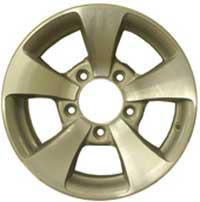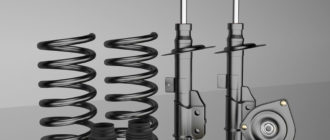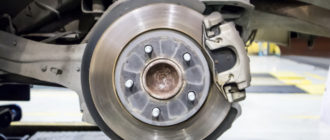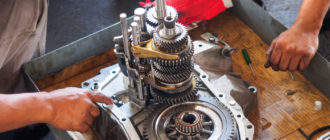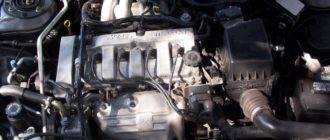A water pump is an essential component of any vehicle’s engine cooling system. It helps circulate coolant through the engine to prevent overheating and maintain optimal engine temperature. A failing water pump can lead to serious engine damage, but it’s not always easy to detect. In this article, we’ll highlight five red flags to watch out for that indicate your water pump may be failing.
One of the most common signs of a failing water pump is overheating. If your engine temperature gauge is in the red, or if you notice steam coming from under the hood, it’s a definite red flag. Another red flag is the presence of coolant leaks. If you notice a pool of coolant underneath your vehicle or see it dripping from the engine, it could be a sign that your water pump is failing.
Strange noises coming from your engine can also be a warning sign of a failing water pump. If you hear a whining or grinding noise, it could be an indicator that the bearings in the water pump are failing. You should also pay attention to the condition of the water pump drive belt. If it appears worn or cracked, or if it’s making a squealing noise, it may be time to replace it and check the water pump at the same time.
Another red flag to watch out for is engine performance issues. A failing water pump can cause poor acceleration or a loss of power, which can make it difficult to drive your vehicle. Finally, if your vehicle is experiencing any of these warning signs, it’s essential to get your vehicle inspected by a qualified technician as soon as possible. Ignoring a failing water pump can lead to extensive engine damage and costly repairs.
In conclusion, while it may be challenging to detect a failing water pump, keeping an eye out for these red flags can help you stay ahead of potential engine damage. Don’t hesitate to seek help from a qualified mechanic if you notice any of these warning signs. Regular maintenance and inspections can help you avoid costly repairs down the line.
Decreased Water Pressure: A Red Flag to Watch Out for When Spotting a Failing Water Pump
If you notice a sudden drop in water pressure in your home, it could be a sign that your water pump is failing. The water pump is responsible for providing a steady flow of water to your home’s plumbing system, and a decrease in water pressure could be a warning sign that it’s not working as well as it should be.
There are a number of reasons why a water pump can fail, including worn out or damaged parts, clogged pipes, or a faulty control system. If you’re experiencing decreased water pressure in your home, it’s important to take action right away to prevent further damage and ensure that you and your family have access to a reliable supply of clean water.
Other red flags to watch out for when spotting a failing water pump include unusual noises coming from the system, leaks or puddles around the pump or along the pipes, and frequent system shutdowns or water flow interruptions. Monitoring your water pump regularly and addressing any issues as soon as they arise can help you avoid costly repairs and ensure the safe and reliable operation of your home’s plumbing system.
- Tip: To keep your water pump in top condition, consider investing in regular maintenance and cleaning services from a licensed plumbing professional.

source: https://mechanicbase.com/coolant/bad-water-pump-symptoms/
Strange Noises: A Sign of a Failing Water Pump
If you’re hearing strange noises coming from your car, it could be a sign of a failing water pump. Your water pump is responsible for circulating coolant through your engine to prevent it from overheating, and if it fails, it can cause serious engine damage. Here are five red flags to watch out for to spot a failing water pump:
- Noise: If you hear a high-pitched whine or grinding sound coming from the front of your engine, it could be a sign that your water pump bearings are failing.
- Leaking: Check your engine for any signs of coolant leaks around the water pump. If you notice leaks, it could indicate that the water pump seal has failed.
- Overheating: If your engine is consistently running hot, it could be a sign that your water pump isn’t circulating coolant properly.
- Steam: If you see steam coming from under your hood, it could be a sign that your engine is overheating due to a failing water pump.
- Vibrations: If you feel vibrations coming from your engine, it could be due to a failing water pump impeller.
If you notice any of these red flags, it’s important to get your car to a mechanic as soon as possible for a water pump inspection. Ignoring these signs can lead to costly engine damage and potentially leave you stranded on the side of the road. Keep an eye (and an ear) out for these warning signs to prevent a failing water pump from causing major headaches down the road.
Signs of a Failing Water Pump
Leaks and moisture are two important red flags to watch out for when it comes to spotting a failing water pump. Leaks can occur due to worn out seals, cracks or holes in the water pump housing or a damaged impeller. Check for any puddles of coolant or water under your vehicle, and look for any dripping from the water pump itself. Moisture in the engine bay can also indicate a faulty water pump, as this part is responsible for circulating coolant through the engine to regulate its temperature.
If you notice any strange noises coming from your water pump, it could also be a sign of trouble. A failing water pump can create a whining or grinding sound, due to worn out bearings or a damaged impeller. Additionally, if your engine is overheating or your temperature gauge is fluctuating, it’s important to have your water pump inspected to rule out any issues.
In addition to leaks and moisture, it’s important to keep an eye out for other red flags such as a loose or damaged belt, poor performance or decreased fuel efficiency. These signs can also indicate a failing water pump and should be addressed promptly to avoid further damage and costly repairs.
- Watch out for leaks and moisture around the water pump
- Listen for strange noises coming from the water pump
- Keep an eye out for poor performance or decreased fuel efficiency
- Inspect the water pump if you experience overheating or fluctuating temperatures
- Address any red flags promptly to avoid further damage and costly repairs

source: https://mechanicbase.com/coolant/bad-water-pump-symptoms/
Vibration: Key Indicator of a Failing Water Pump
Water pumps are vital components of any water delivery system, but they can fail over time due to various reasons. One of the key indicators of a failing water pump is vibration. Excessive vibration can cause serious damage to the pump and other components of the water delivery system, and can even cause injury to people nearby.
There are several red flags to watch out for when it comes to vibration in a water pump. First, if you notice an unusual amount of noise or vibration coming from the pump, this may be a sign that something is wrong. Second, if the pump is vibrating more than usual, this may indicate wear and tear on the pump and other components. Third, if the pump is making unusual sounds or experiencing unusual vibrations, this may indicate a problem with the pump motor or impeller.
It’s important to address any abnormal vibrations in a water pump as soon as possible in order to prevent further damage and ensure the safety of everyone involved. Regular maintenance and inspection of water pumps can help prevent these issues from arising in the first place.
- Regular maintenance and inspection of water pumps is crucial for preventing vibration and other issues.
- Unusual noises, vibrations, and movements can indicate a problem with the pump, motor, or other components.
- Prompt attention to these issues can prevent further damage and ensure everyone’s safety.
5 Red Flags to Watch Out for to Spot a Failing Water Pump: Age of Equipment Matters
A water pump is an essential component of any well-functioning plumbing system. It’s responsible for supplying water to your home or commercial building. If your water pump is in good condition, it will provide you with clean and safe water for years to come. However, as your water pump gets older, it’ll become more prone to failure. Below are some red flags to watch out for to spot a failing water pump, starting with the age of equipment.
- Age of equipment: A water pump typically lasts for around 10 to 15 years before it needs to be replaced. As your pump approaches this age range, you’ll want to start monitoring its performance closely. An old water pump is more susceptible to failure and may experience issues such as leaks, loud noises, or reduced water pressure.
- Noise: If your water pump is making new or unusual noises, it may be an indication that some parts are wearing out. Clanking, grinding, or squealing sounds are all signs that it’s time to take a closer look at your water pump.
- Low water pressure: A water pump that’s failing may not provide adequate water pressure. If you’re noticing a decrease in water pressure, it’s time to investigate the issue further.
- Leaks: Leaks are a serious issue and can lead to significant water damage if left unaddressed. If you notice visible leaks around your water pump or the surrounding plumbing, it’s time to call a professional plumber.
- Higher energy bills: A failing water pump will require more energy to operate efficiently, leading to higher utility bills. If you see a sudden increase in your energy bills, your water pump may be the culprit.
By understanding and keeping an eye out for these red flags, you can avoid costly repairs and potential water damage caused by a failing water pump. Regular maintenance and prompt repairs can extend the life of your water pump and keep your plumbing system functioning at optimal levels.
A failing water pump may show signs of leaks, noises, overheating, the engine running hot, or low pressure.
A water pump may fail due to worn-out bearings, a broken impeller, corrosion, or a damaged seal.
It is crucial to replace a failing water pump as it can result in engine damage, overheating, and complete engine failure.
The average lifespan of a water pump is around 100,000 miles or 7-10 years, depending on the make and model of the car.
It depends on the severity of the damage. Small leaks or worn-out bearings can be repaired, but a broken impeller or severe corrosion usually requires a replacement.
The cost of replacing a water pump varies depending on the make and model of the car, with an average cost ranging from $300 to $1,000.
Regularly checking for leaks, changing the coolant on schedule, and keeping the engine clean and cool can extend the lifespan of a water pump.
